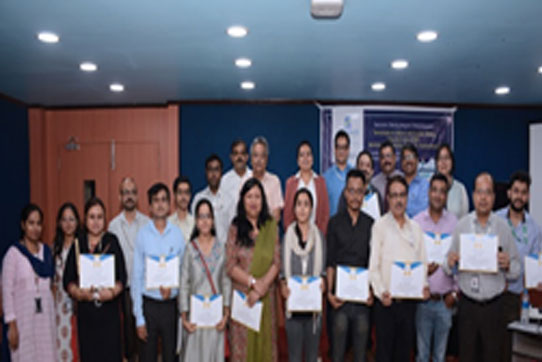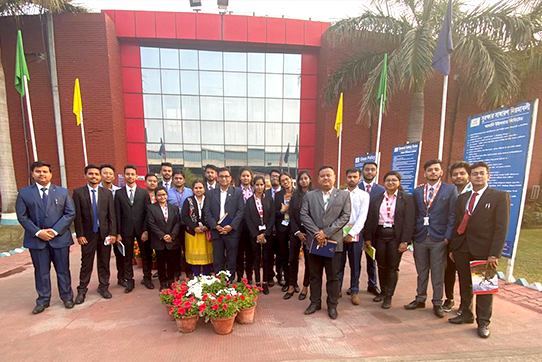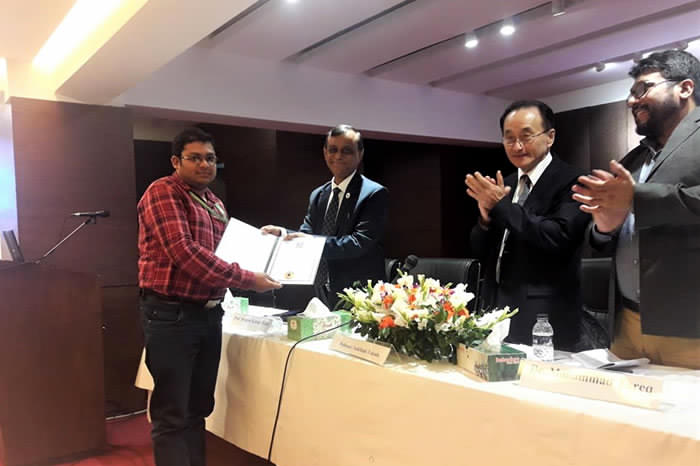Date and Venue:
14th September 2019, Bharat Chamber of Commerce
Speakers:
ADAMAS University
1. Prof. Dr. Ratan Khasnobis, Dean, School of Economics and Commerce, Adamas University
2. Ms. Mitali Nikore, Assistant Director, School of Economics and Commerce, Adamas University
3. Dr. Rituparna Das, Professor, School of Economics and Commerce, Adamas University
Bharat Chamber of Commerce
1. Shri Sitaram Sharma, President, BCC
2. Shri Satish Kapoor, Senior Vice President, BCC
3. Ms. Keka Sarma, Secretary General, BCC
Key Highlights:
The School of Economics and Commerce, Adamas University, in association with Bharat Chamber of Commerce (BCC) organized a “Brain Storming Session on Skill Training for MSME Entrepreneurs” on 14th September 2019 in Kolkata. The interactive session witnessed the participation of eminent personalities such as Prof. Dr. Ratan Khasnobis, Dean, School of Economics and Commerce, Adamas University, Ms. Mitali Nikore, Assistant Director, School of Economics and Commerce, Adamas University, Dr. Rituparna Das, Professor, Adamas University, Mr. Soumik Sarkar, Assistant Professor, Adamas University and six students of the Dept. of Economics from Adamas University, named of the list of attendees in the Annexure, Shri Sitaram Sharma, President, BCC, Shri Satish Kapoor, Senior Vice President, BCC and Ms. Keka Sarma, Secretary General, BCC. The program was attended by about 15-20 eminent MSME industrialists across different sectors including textiles, jute, tea, plywood, metal products, engineering goods, iron and steel, etc.
1. The key takeaway from the discussion was a proposed collaboration between AdamasUniversity and BCC to provide industry specific technical training to the MSME entrepreneurs through development of training modules. Some of the key focus areas identified during the brainstorming session are the following:
a. Digital Marketing
b. Assisting jute and textile industries in developing products (e.g. carry bags) to replace plastic in domestic and export markets
c. Water conservation and sustainable manufacturing methods based on global best practices
d. Understanding government schemes for MSMEs and how to avail their benefits
e. Digital Transformation
2. The session highlighted the need for skill development of MSMEs and discussed the various initiatives taken for the MSMEs by the Government of India as well as Governments in other developed and developing countries.
3. Prof. Ratan Khasnobis presented the economic landscape of Indian MSMEs by showcasing data on labour force contribution, export-import and GDP contribution of MSMEs. MSMEs contribute more than 40% to the export and around 45% to the total industrial output. At present, over 36 million MSMEs are providing employment to around 1.5 crore people across the country and, hence, they deserve special attention. An analysis of the development of small-scale industries with a comparative study of India and China was also presented.
4. Dr. Rituparna Das presented the financing bottlenecks facing MSMEs with reference to their absence in capital market and also widespread loan default practices by MSMEs consequent upon the banks’ reluctance to lend. He propose certain measures to measure the same.
5. Ms. Mitali Nikore elaborated on the conditions of Indian MSMEs and the challenges they are facing, including low productivity, limited access to formal credit and lack of awareness about government schemes. Best practices in MSME sector across the world were also presented, covering developing countries like Kenya, Philippines, and Indonesia, as well as China. Ms. Nikore also narrated real life experiences of working with the MSME sector in Uttar Pradesh, Rajasthan, Madhya Pradesh, North-east and Punjab. Ms. Nikore then also focused on the role of entrepreneurship training to improve MSME productivity, and pointed out that training at an MSME should be undertaken at 3 levels:
a. Entrepreneur / leadership training (tier 1)
b. Training for office staff / managers (tier 2)
c. Skill training for labour (tier 3)
6. Industries pointed out that the biggest gap for them lay in tier 2, i.e. office staff / management training. They also agreed that some of these trainings could be useful for them as entrepreneurs as well.
7. It was proposed that Adamas University canbecome a knowledge partner for Bharat Chamber of Commerce, promote thought leadership, and assist BCC with its mission of entrepreneurship training and skill development for the MSME sector. This proposal was appreciated by industry representatives.
8. Shri Sitaram Sharma agreed with this proposal. He stressed on the need for reinvention of mechanisms for skill development to meet industry needs. He stated that he would like his team at BCC to work in collaboration with the team at Adamas University in order to develop tailored short-term training modules which could be offered to BCC members.
Next Steps:
1. Adamas University and Bharat chamber of Commerce to have discussions on development of short-term training modules in the areas identified during the brainstorming session.
2. This discussion will focus on identifying priority areas, training duration, training calendar, and experts to deliver the trainings.
ANNEXURE – List of key attendees:
1. Mr. Avik Roy, BCC
2. S.C. Basu, Shrihari global
3. D. Sinha, VT Enterprises Pvt. Ltd.
4. Gautam Das, IFA
5. A. Majomdar, SAP
6. Ashok Kr. Agarwal, Insolvency Professional
7. Mukesh Kumar, Dollar Industries Ltd.
8. Sujata Dutta, GIMT
9. Milan Kumar Dey, Industry representation
10. Rahul Sharma, Om Tea Pvt. Ltd.
11. Vikram Tantia, Industry representation
12. Samik Ghosal, SRBM TMT
13. Subhabrata Dasgupta, SRBM Srijan
14. Roma Dutta, Jadavpur University
15. R G Agarwal, Industry representation
16. Mr. Soumik Sarkar, Assistant Professor, Adamas University
17. Priyanka Ghosh, Student, Adamas University
18. Rijupalika Dey, Student, Adamas University
19. Soni, Student, Adamas University
20. Shekhar Kr. Agrawala, Student, Adamas University
21. Sanjana Chakraborty, Student, Adamas University
22. Shrestha Barman, Student, Adamas University







